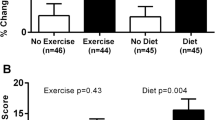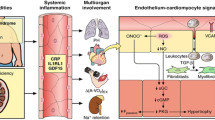Abstract
Cardiac resynchronization therapy (CRT) improves quality of life, left ventricular (LV) size and function, and mortality among moderate to severe symptomatic congestive heart failure (CHF) patients with decreased LV ejection fraction and QRS prolongation. Whether these benefits extend to similar groups with minimal or mild CHF is an area of ongoing investigation. Two small studies with limited follow-up demonstrated reverse remodeling but no symptomatic improvement. A recent, larger study in a population of asymptomatic or mildly symptomatic CHF patients with longer follow- up confirmed the beneficial effect of CRT on LV size and function; furthermore, it was the first study to show that CRT improves clinical outcome with delayed time to heart failure hospitalization. Ongoing trials of CRT in such patients will soon provide further data on morbidity and mortality.
Similar content being viewed by others
References and Recommended Reading
Cazeau S, Leclercq C, Lavergne T, et al.: Effects of multisite biventricular pacing in patients with heart failure and intraventricular conduction delay. N Engl J Med 2001, 344:873–880.
Abraham WT, Fisher WG, Smith AL, et al.: Cardiac resynchronization in chronic heart failure. N Engl J Med 2002, 346:1845–1853.
Young JB, Abraham WT, Smith AL, et al.: Combined cardiac resynchronization and implantable cardioversion defibrillation in advanced chronic heart failure: the MIRACLE ICD Trial. JAMA 2003, 289:2685–2694.
Bristow MR, Saxon LA, Boehmer J, et al.: Cardiac-resynchronization therapy with or without an implantable defibrillator in advanced chronic heart failure. N Engl J Med 2004, 350:2140–2150.
Cleland JG, Daubert JC, Erdmann E, et al.: The effect of cardiac resynchronization on morbidity and mortality in heart failure. N Engl J Med 2005, 352:1539–1549.
St John Sutton MG, Plappert T, Abraham WT, et al.: Effect of cardiac resynchronization therapy on left ventricular size and function in chronic heart failure. Circulation 2003, 107:1985–1990.
Diaz-Infante E, Mont L, Leal J, et al.: Predictors of lack of response to resynchronization therapy. Am J Cardiol 2005, 95:1436–1440.
Yu CM, Bleeker GB, Fung JW, et al.: Left ventricular reverse remodelling but not clinical improvement predicts long term survival after cardiac resynchronization therapy. Circulation 2005, 112:1580–1586.
Hunt SA, Abraham WT, Chin MH, et al.: ACC/AHA 2005 Guideline Update for the Diagnosis and Management of Chronic Heart Failure in the Adult: a report of the American College of Cardiology/American Heart Association Task Force on Practice Guidelines (Writing Committee to Update the 2001 Guidelines for the Evaluation and Management of Heart Failure): developed in collaboration with the American College of Chest Physicians and the International Society for Heart and Lung Transplantation: endorsed by the Heart Rhythm Society. Circulation 2005, 112:e154–e235.
Randomised trial of cholesterol lowering in 4444 patients with coronary heart disease: the Scandinavian Simvastatin Survival Study (4S) [no authors listed]. Lancet 1994, 344:1383–1389.
Randomised trial of intravenous streptokinase, oral aspirin, both, or neither among 17,187 cases of suspected acute myocardial infarction: ISIS-2 [no authors listed]. Lancet 1988, 2:349–360.
A comparison of antiarrhythmic drug therapy with implantable defibrillators in patients resuscitated from near fatal ventricular arrhythmias. The Antiarrhythmics vs. Implantable Defibrillator (AVID) Investigators. N Engl J Med 1997, 337:1576–1583.
Effect of enalapril on survival in patients with reduced left ventricular ejection fractions and congestive heart failure. The SOLVD Investigators. N Engl J Med 1991, 325:293–302.
Effect of metoprolol CR/XL in chronic heart failure: Metoprolol CR/XL Randomised Intervention Trial in Congestive Heart Failure (MERIT-HF). MERIT-HF Study Group. Lancet 1999, 353:2001–2007.
Higgins SL, Hummel JD, Niazi IK, et al.: Cardiac resynchronization therapy for the treatment of heart failure in patients with intraventricular conduction delay and malignant ventricular tachyarrhythmias. J Am Coll Cardiol 2003, 42:1454–1459.
Abraham WT, Young JB, Leon AR, et al.: Effects of cardiac resynchronization on disease progression in patients with left ventricular systolic dysfunction, an indication for an implantable cardioverter-defibrillator, and mildly symptomatic chronic heart failure. Circulation 2004, 110:2864–2868.
Linde C, Abraham WT, Gold MR, et al.: Randomized trial of cardiac resynchronization in mildly symptomatic heart failure patients with left ventricular dysfunction and previous heart failure symptoms. J Am Coll Cardiol 2008, 52:1834–1843.
Moss AJ, Brown MW, Cannom DS, et al.: Multicenter Automatic Defibrillator Implantation Trial-Cardiac Resynchronization Therapy (MADIT-CRT): design and clinical protocol. Ann Noninvasive Electrocardiol 2005, 10(4 Suppl):34–43.
Clinical Trials.gov: Resynchronization/defibrillation for ambulatory heart failure trial. Available at http://www.clinicaltrials.gov/ct2/show/NCT00251251?term=Canada%2C+CRT&rank=6. Accessed October 2008.
Author information
Authors and Affiliations
Corresponding author
Rights and permissions
About this article
Cite this article
Forcina, M.S., Gold, M.R. Role of cardiac resynchronization therapy in asymptomatic and mildly symptomatic heart failure. Curr Heart Fail Rep 6, 44–48 (2009). https://doi.org/10.1007/s11897-009-0008-6
Published:
Issue Date:
DOI: https://doi.org/10.1007/s11897-009-0008-6




